It is a cover letter that acts as a formal document that accompanies your resume when you apply for a nursing position as a new graduate.
The purpose of it is to introduce yourself to the hiring manager and explain why you are interested in the job and how you are qualified for it.
In your letter, you should highlight your nursing education, and clinical experience you have gained, and any relevant nursing skills or certifications. You should also express your enthusiasm for the job and for joining the healthcare team of the facility you are applying to.
The letter should be well-structured, concise, and professional in tone. It should be tailored to the specific job you are applying for and address the requirements and qualifications listed in the job description.
A well-written letter can help you stand out from other applicants and demonstrate your interest in and enthusiasm for the position. It can also give the employer a sense of your personality and communication skills, which are important qualities for a nurse to have.
Overall, it is a crucial part of your job application package and should be written with care and attention to detail.
When is It Required?
It is generally required when you are applying for a nursing position in a hospital, healthcare facility, or other healthcare organization. In many cases, it is requested by the employer as part of the job application process, along with a resume and other required documents.
It is particularly important for new graduate nurses who may not have extensive work experience in the field yet. It allows you to showcase your nursing education, any clinical experience you have gained, and your passion for the profession. It also allows you to explain why you are interested in the position and how you can contribute to the healthcare team.
However, there may be some instances where it is not required, such as when applying for a nursing position through an online application system that does not provide an option to upload a cover letter. In such cases, it is important to carefully review the job posting and application instructions to determine if it is necessary or not.
Overall, even if it is not required, it can be beneficial to include one as it allows you to personalize your application and demonstrate your interest and qualifications for the position.
Purpose of a Cover Letter for New Graduate Nurse
It serves the specific purpose of proving that you are a capable candidate. No matter how perfect your resume is, HR managers may overlook it among many other applications. But a nicely written cover letter provides insights into your professional certification, work history, and education and persuades the potential employer to read your resume as well.
It serves various purposes, as discussed below:
Identifies your intent
Resumes are valid proof of your expertise. However, a cover letter states your intent and explains how your knowledge qualifies you for the specific role. HR managers can see your vision, mission, and aspiration toward dedicating yourself to the nursing profession.
HR managers and recruiters value candidates willing to advance in their careers and develop leadership qualities. It is the perfect document for displaying such aspirations.
Provides a detailed description of a candidate
It outlines your professional determination to fulfill your employer’s expectations.
It provides insights into your perspectives, interests, experiences, weaknesses, and strengths, and an employer can form an opinion of you as a professional based on that.
Explains the gaps in the resume
As a newly graduated nurse, it is unlikely that you will have many gaps in your career trajectory. But if you have taken a career break or switched fields, the cover letter gives you an opportunity to mention that.
Steps to Writing a Cover Letter as a Fresh Graduate Nurse
It must follow the correct format and structure. The following guide provides detailed information about the steps to writing a unique, interesting, and engaging cover letter:
The header is the first thing the hiring manager sees, telling them who you are. The details should match the ones on your resume, showing professionalism and attention to detail.
The header of it should include the following details:
- Your name
- Phone number
- Email address
- Residential address
- Date
Proper salutations
A cover letter is your first contact with your future employer. Therefore, you must make a good first impression and use professional greetings. You can do that by including: “Dear recruiter.’’ That is perfect if you cannot determine the hiring manager’s name.
An engaging introduction
An engaging introduction is the best proof of your enthusiasm and determination to become a professional nurse. It is vital to mention the title of the position you are applying for in the opening paragraph. Additionally, a good introduction should explain your qualifications for the position and how you found the job posting.
Discuss your qualifications and experience
Include any previous internship experience, training, academic accomplishments, or work experience in your letter. These details enable hiring professionals to link your qualifications to the role. They also help you engage with the recruiters and explain how you fit the position and why they should choose you over others.
Although your resume already contains your qualifications for the job, you should briefly mention them in your cover letter. However, avoid repetition and do not hesitate to elaborate on your qualifications by including previous experiences that could demonstrate your capabilities as a healthcare professional.
Mention relevant skills
While elaborating on your qualifications, use the opportunity to mention your skills to convince the recruiter that you are the most suitable candidate for the job. In addition, mention your skills in a way that clearly explains how your employer will benefit from hiring you.
Highlight your soft skills, such as communication, leadership, decision-making, empathy, compassion, and kindness. These are the skills that most hiring managers look for when hiring nurses.
Explain your interpersonal approach to solving problems and include real-life experiences and anecdotes as proof of your competence and efficiency.
Finish with a conclusion and a formal closing
The conclusion of the letter should be a summary of your personal information, professional skills, knowledge, and experience. It should be concise, memorable, and succinct enough to resonate with the employer’s inquiry.
Highlight the essentials in the concluding paragraph to outline why hiring managers should choose you over other candidates. Add an engaging call to action to ensure your employers contact you. You can invite the recruiter to schedule an appointment or ask them directly for an interview. Include a professional sign-off. For people you know, use “Yours sincerely.” For people you do not know, use “Yours faithfully.”
Sample Cover Letter
In the following section, a sample cover letter tailored for a newly graduated nurse is provided, offering a practical illustration of how to effectively introduce yourself and highlight relevant skills in the competitive field of healthcare.
sample
Dear Ms. Smith,
I am writing to express my strong interest in the Registered Nurse position in the Pediatrics Department at General Health Hospital, as recently advertised on HealthJobs.com. As a fresh graduate from Springfield University’s Nursing Program with a Bachelor of Science in Nursing (BSN) and a newly acquired license to practice in NT, I am eager to start my nursing career in a prestigious institution like yours, known for its commitment to innovative pediatric care.
My clinical rotations at City Medical Center, particularly in the Pediatric and Neonatal Intensive Care Units, allowed me to develop skills in patient assessment, medication administration, and family-centered care. These rotations were instrumental in honing my ability to communicate effectively with young patients and their families, and collaborate with healthcare teams to develop comprehensive care plans. My preceptors praised my quick adaptability, empathetic approach, and dedication to professional growth.
I am particularly drawn to General Health Hospital due to your renowned Pediatric Center of Excellence and the innovative approaches you employ in child healthcare. The hospital’s commitment to integrating advanced technology and compassionate care aligns perfectly with my professional ethos and aspirations. I am especially impressed by your recent initiative to develop community-based pediatric wellness programs, and I see this as an exciting area where I could contribute my enthusiasm and fresh ideas.
In addition to my clinical skills, I bring strong interpersonal abilities, essential in nursing, such as empathy, effective communication, and the resilience to remain composed in challenging situations. My objective is to support the well-being and recovery of pediatric patients by delivering holistic, patient-centric care. I am also keen on participating in professional development programs and contributing to team or hospital-wide initiatives at General Health Hospital.
Enclosed is my resume, which provides more details about my academic and practical experiences in nursing. I am looking forward to the opportunity to discuss how my passion for pediatric nursing and my skills would be a great match for General Health Hospital. Thank you very much for considering my application. I am enthusiastic about the possibility of joining your team and contributing to the excellent care provided at your facility.
Sincerely,
Alex Taylor
Analysis
This cover letter is an exemplary model for new nursing graduates. It opens clearly, outlining the writer’s intent and qualifications, including a Bachelor of Science in Nursing and a practice license. The letter highlights relevant clinical experiences in Pediatric and Neonatal Intensive Care Units, demonstrating practical skills and alignment with the job requirements.
The applicant showcases key nursing skills and personal attributes like adaptability and empathy, indicating their holistic suitability for the role. Their enthusiasm for the hospital’s Pediatric Center of Excellence reflects a genuine interest in and understanding of the hospital’s goals. The willingness to contribute fresh ideas and engage in community initiatives underscores a proactive approach.
Concluding professionally, the letter encourages further consideration from the employer. Its structured format and professional tone make it a concise and effective guide for nursing graduates, blending qualifications, relevant experiences, and alignment with the employer’s values.
Download Free Templates
Given below are new graduate nurse cover letter templates:
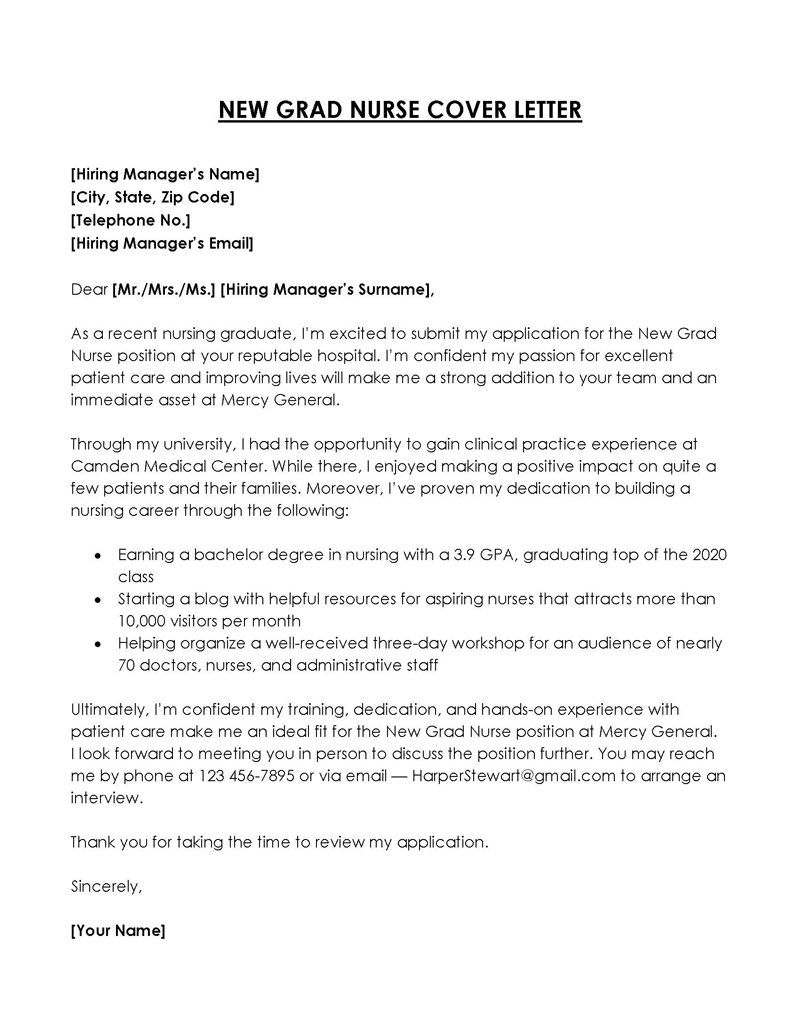
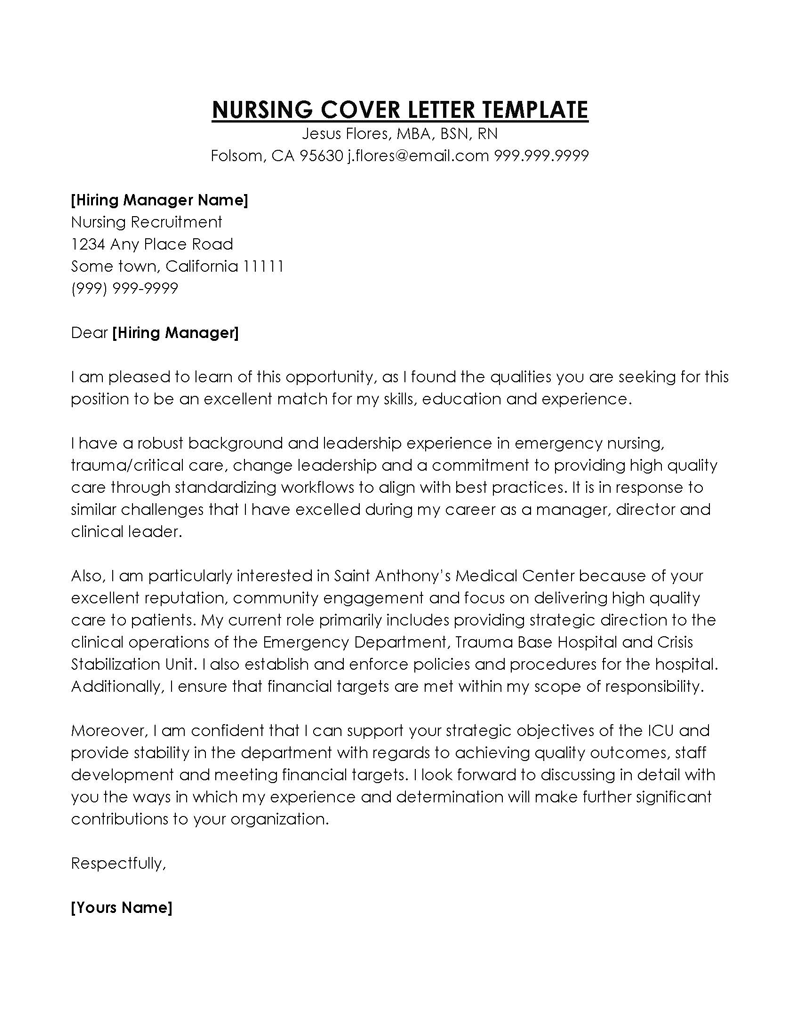
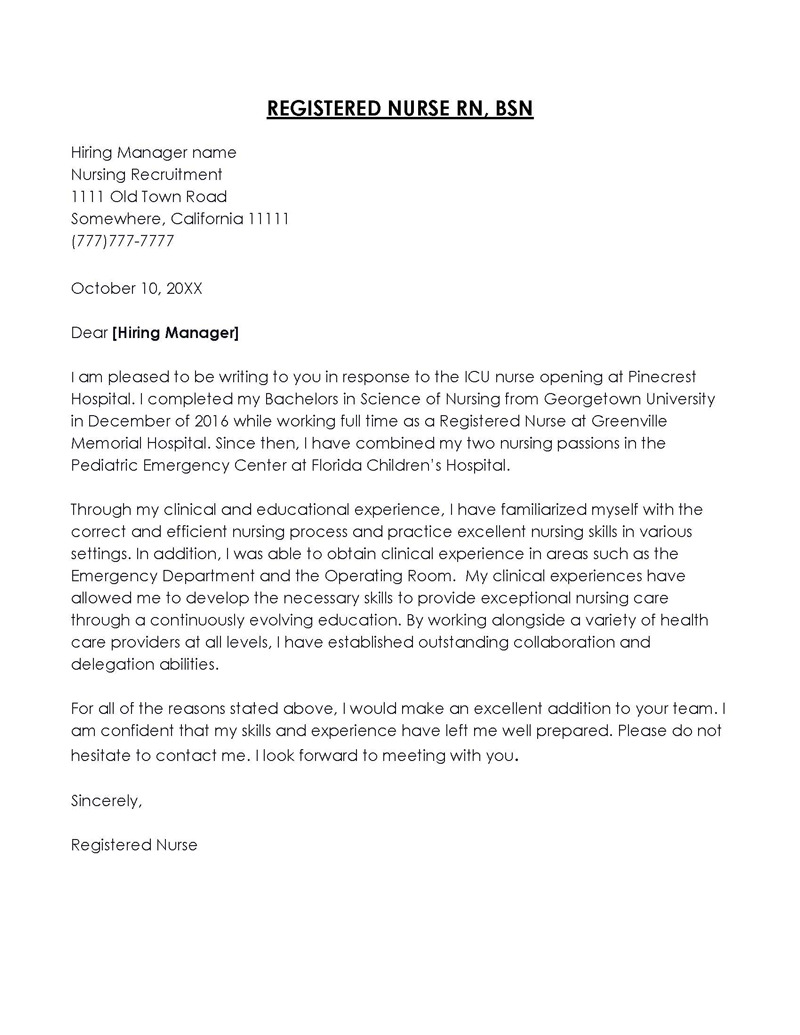
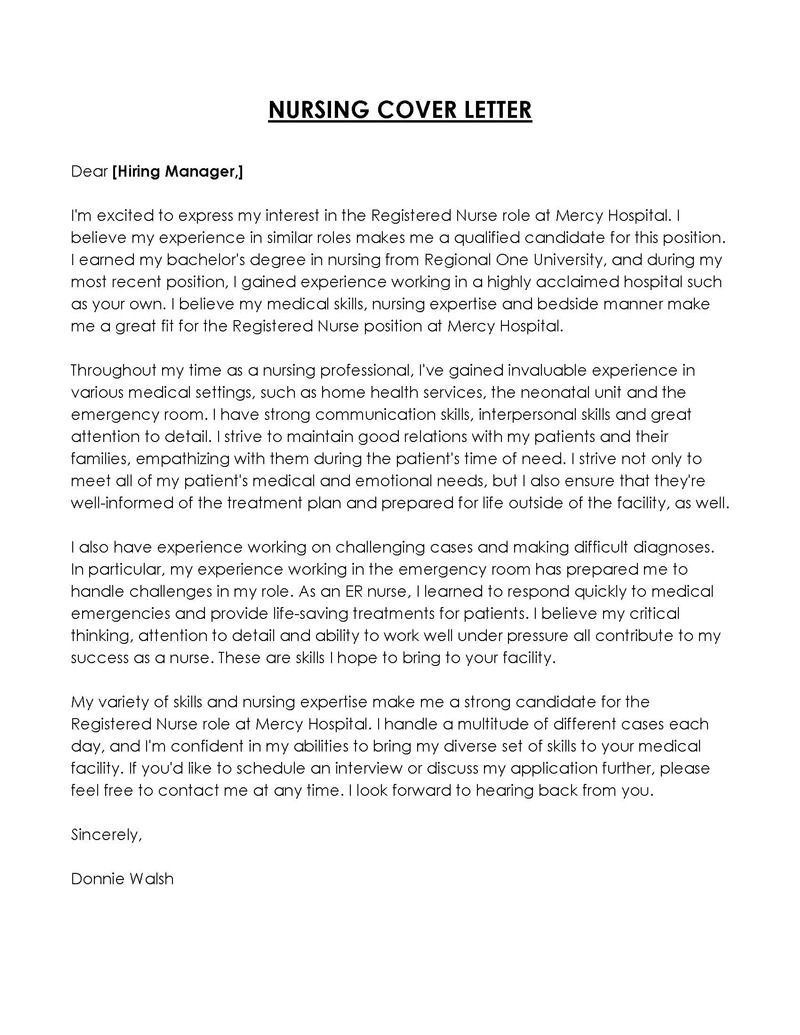
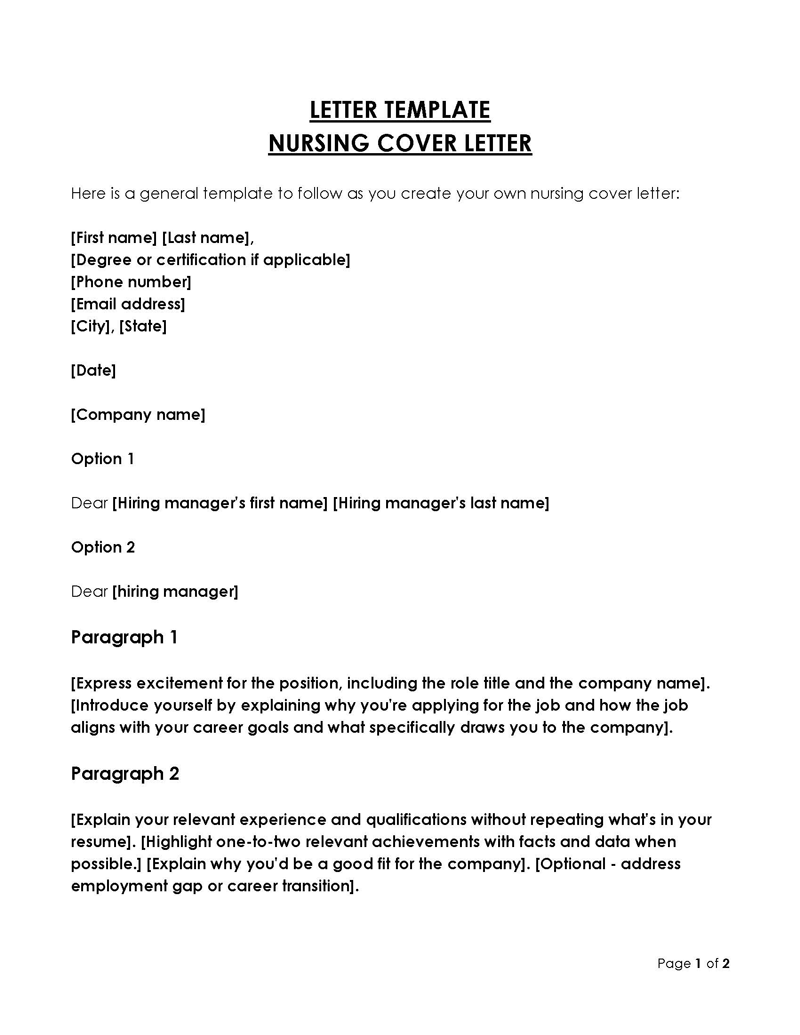
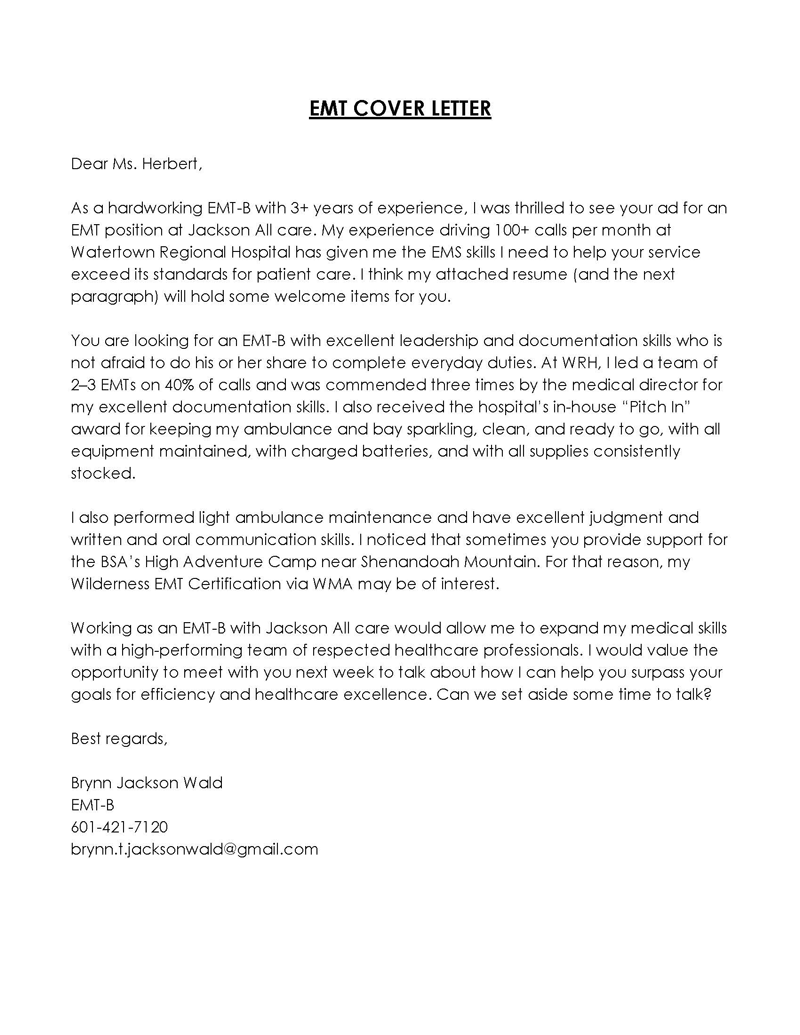
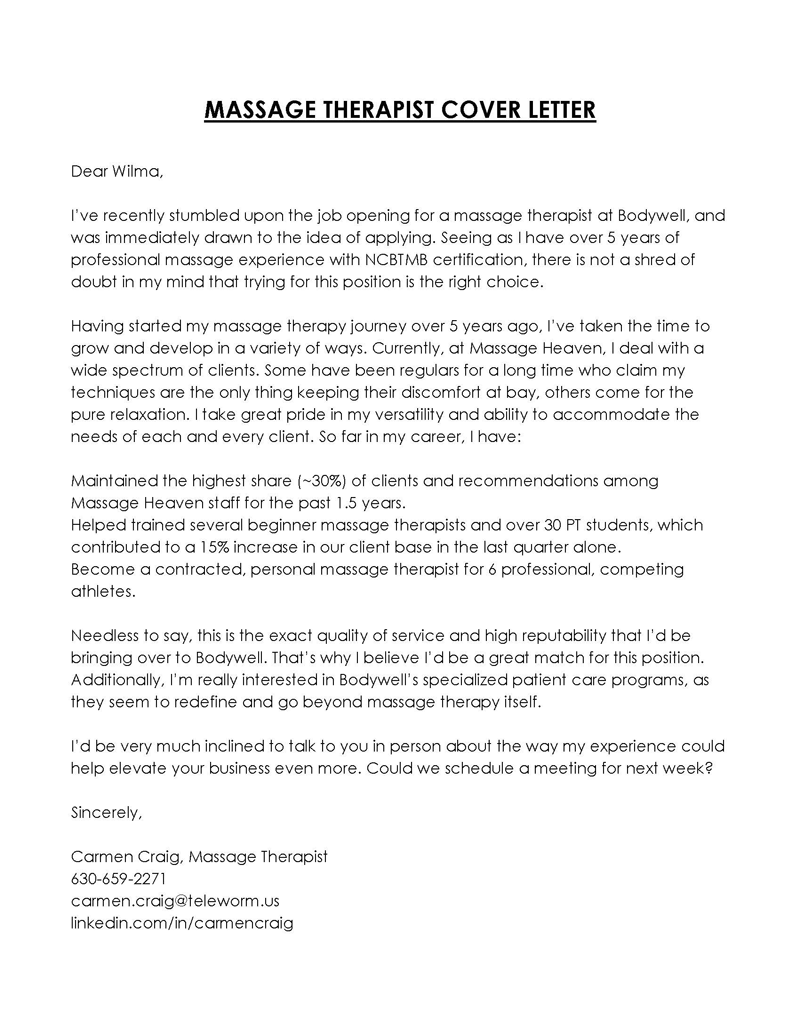
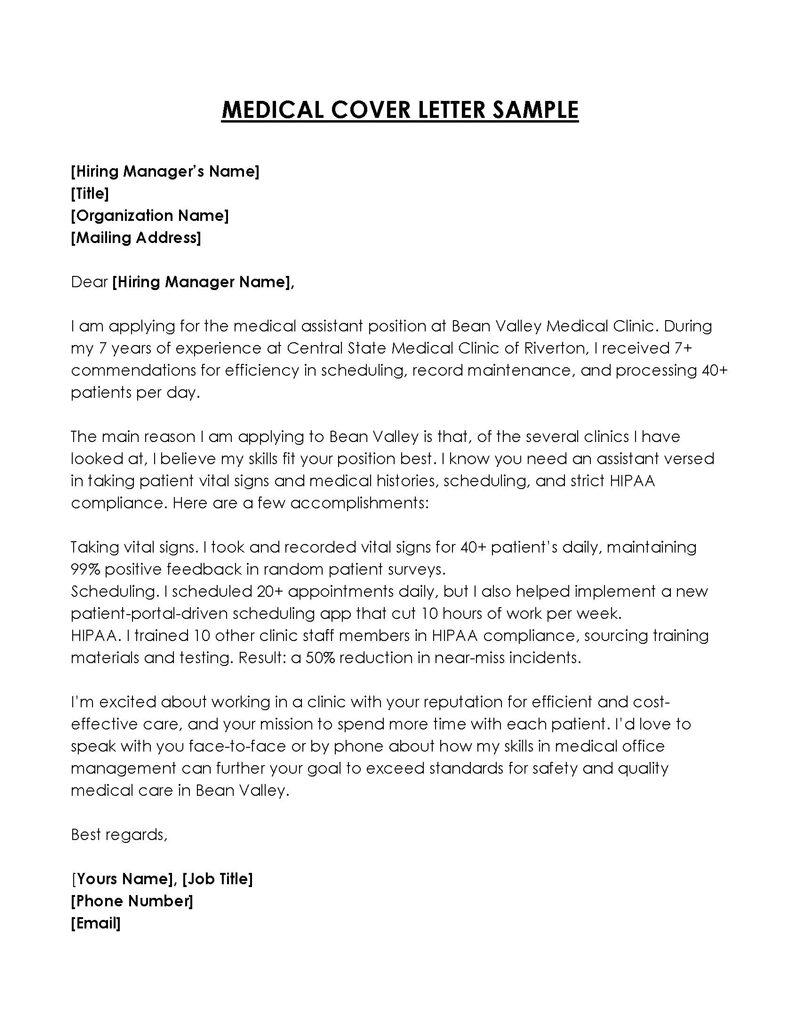
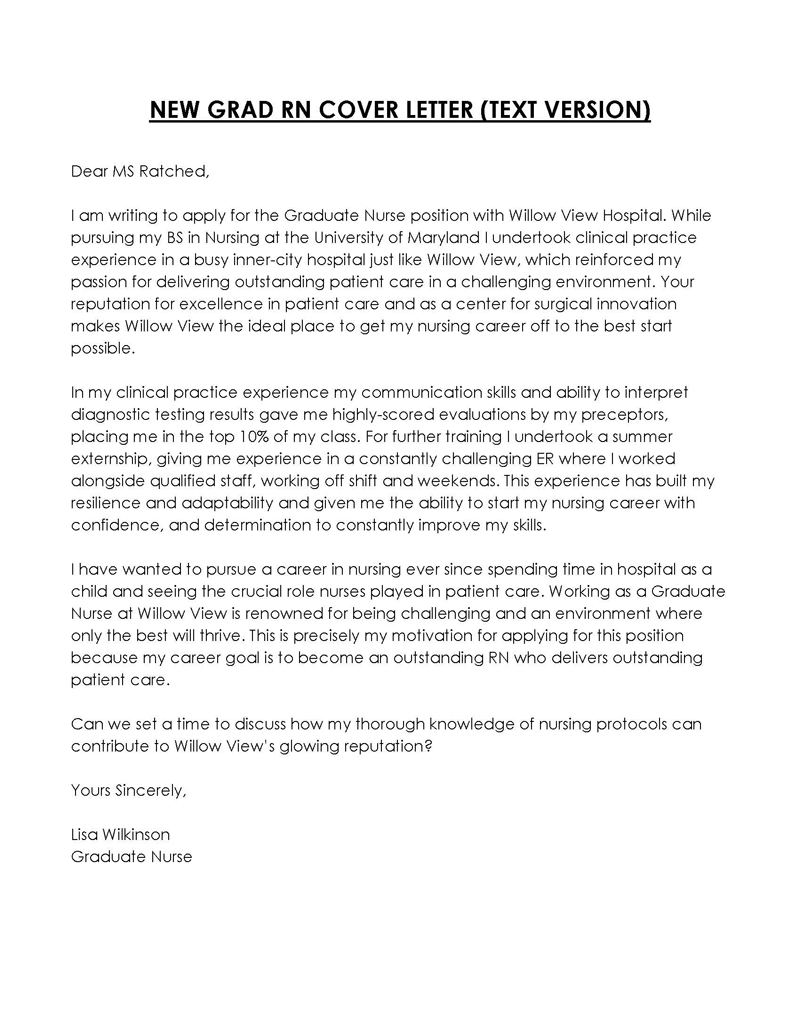
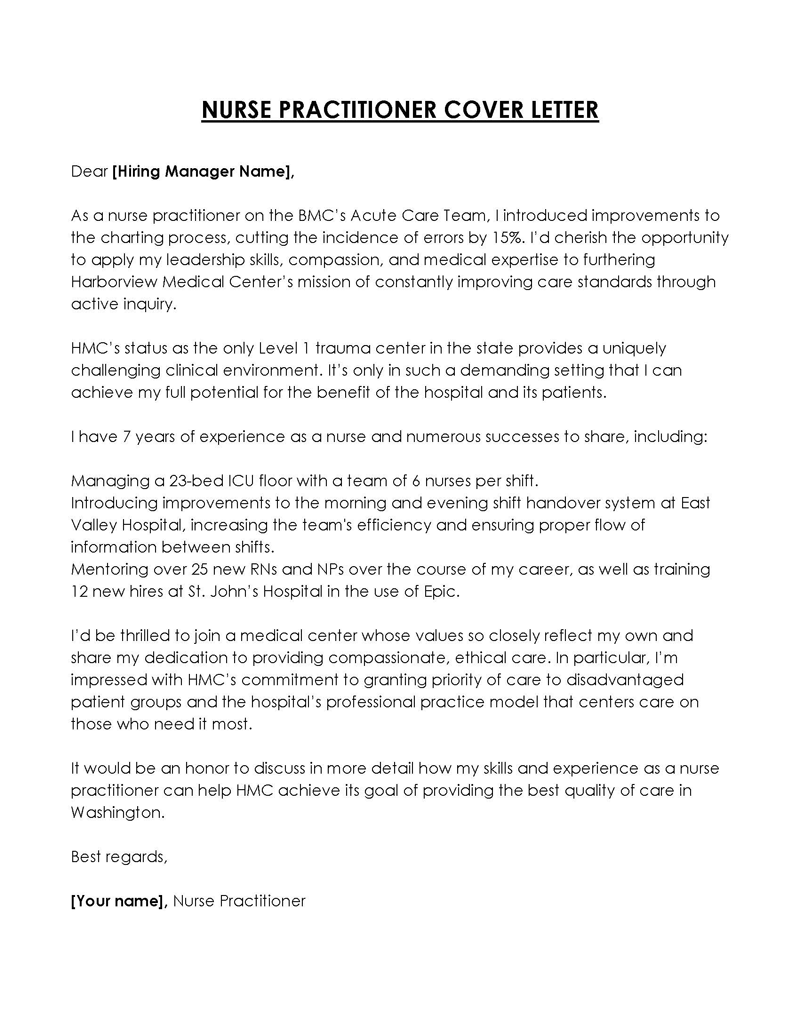
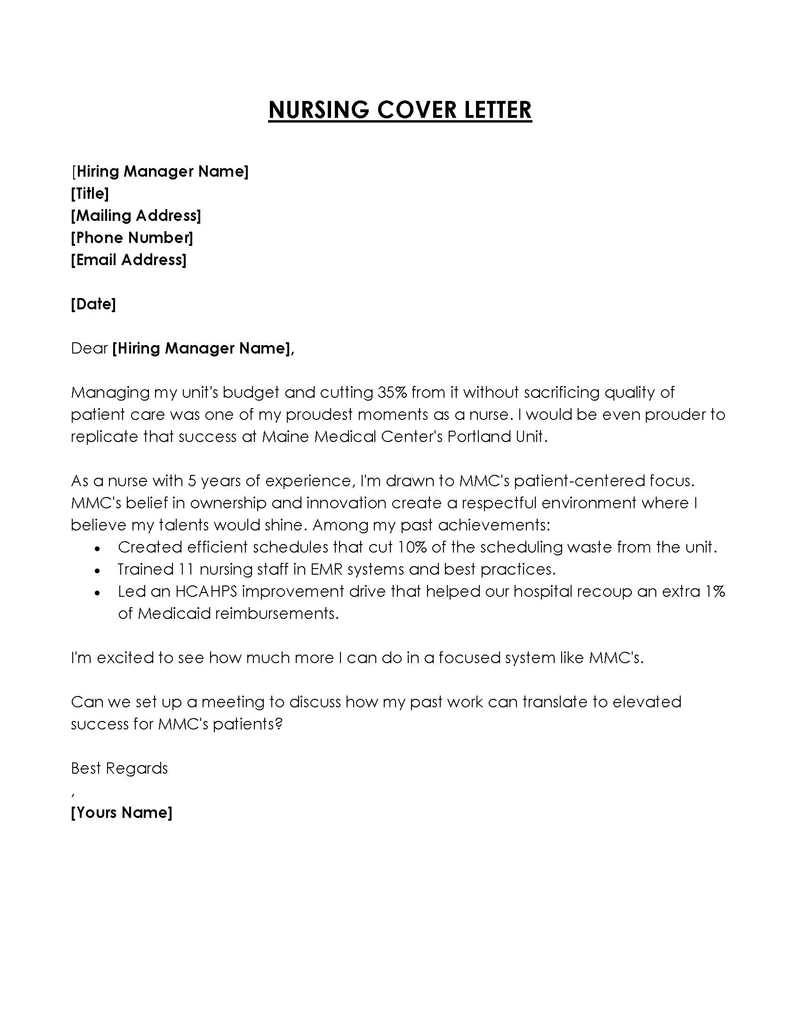
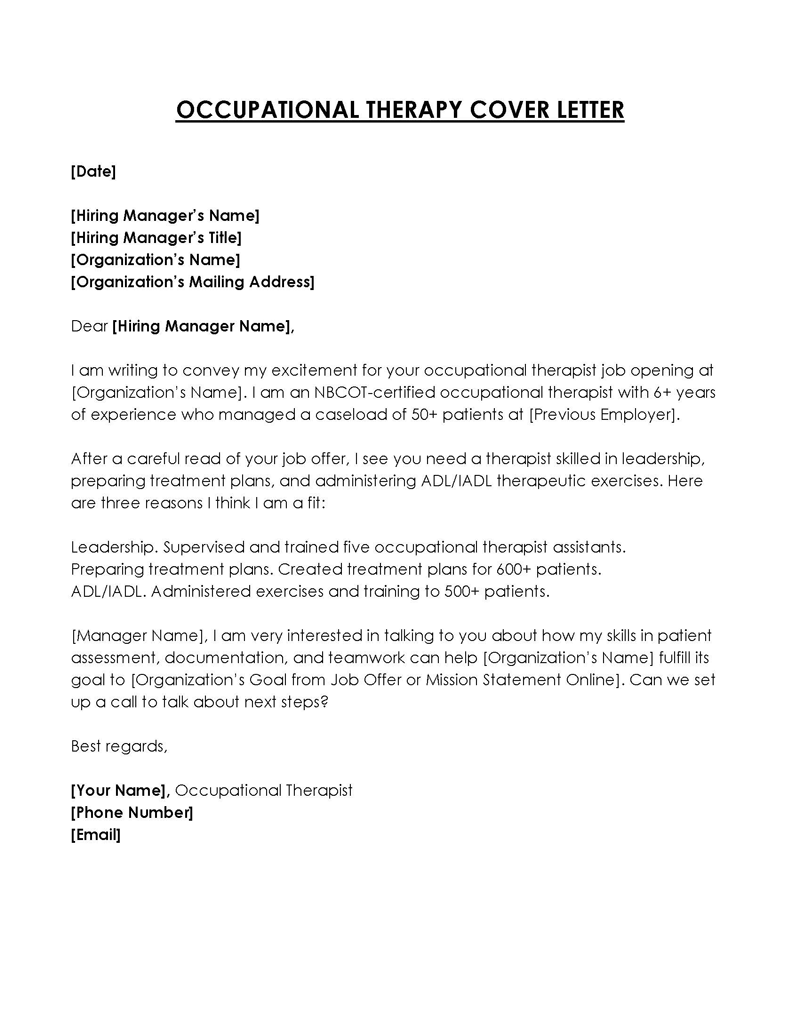
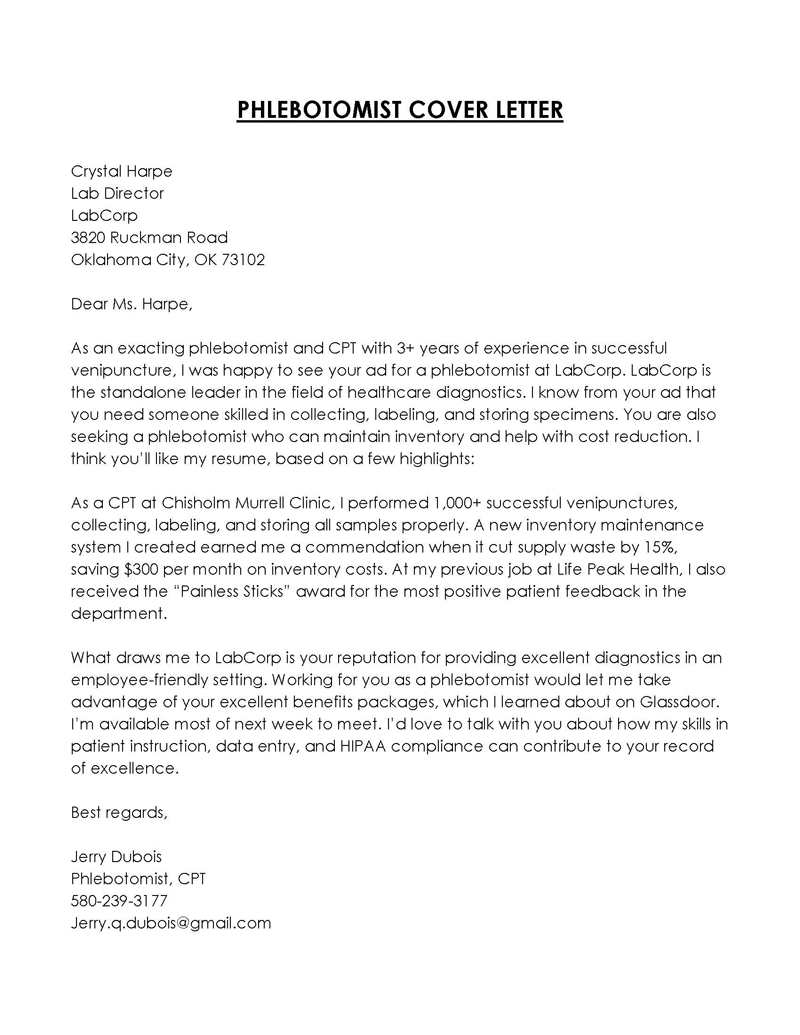
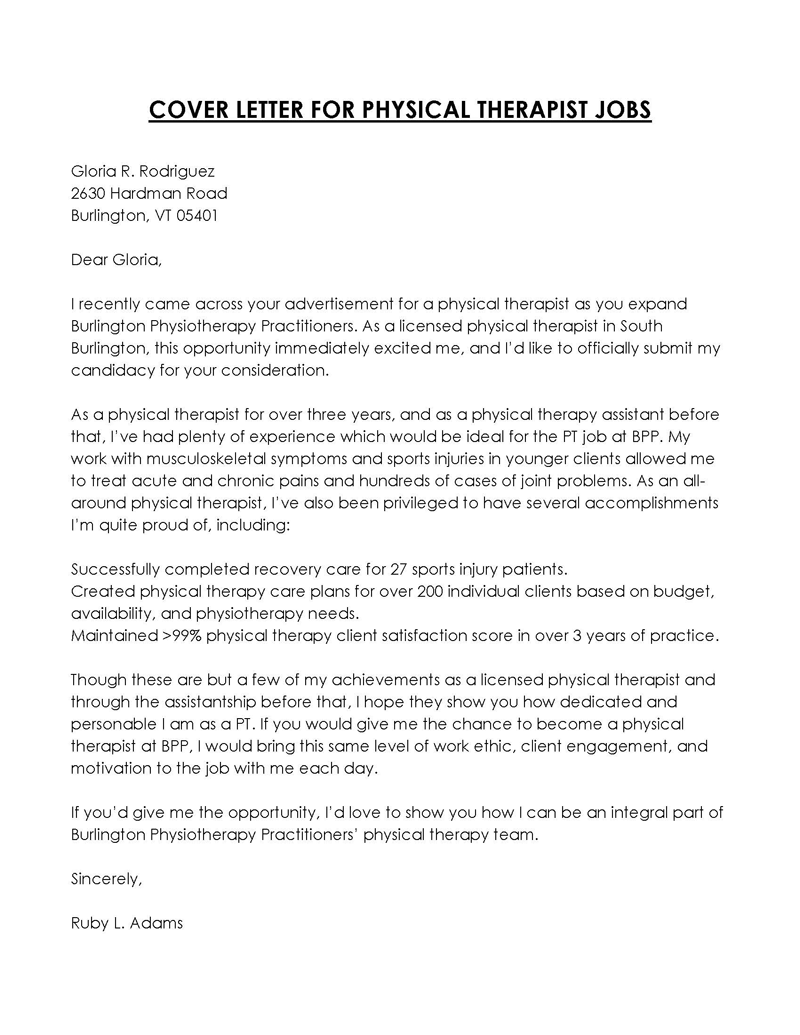
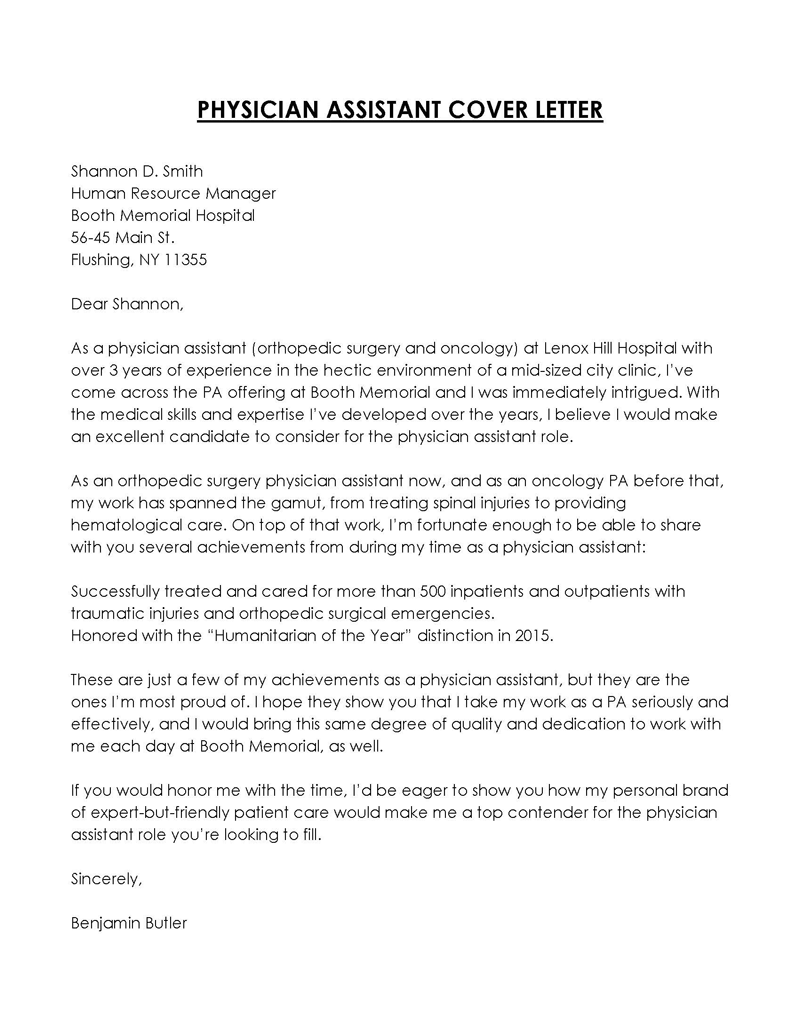
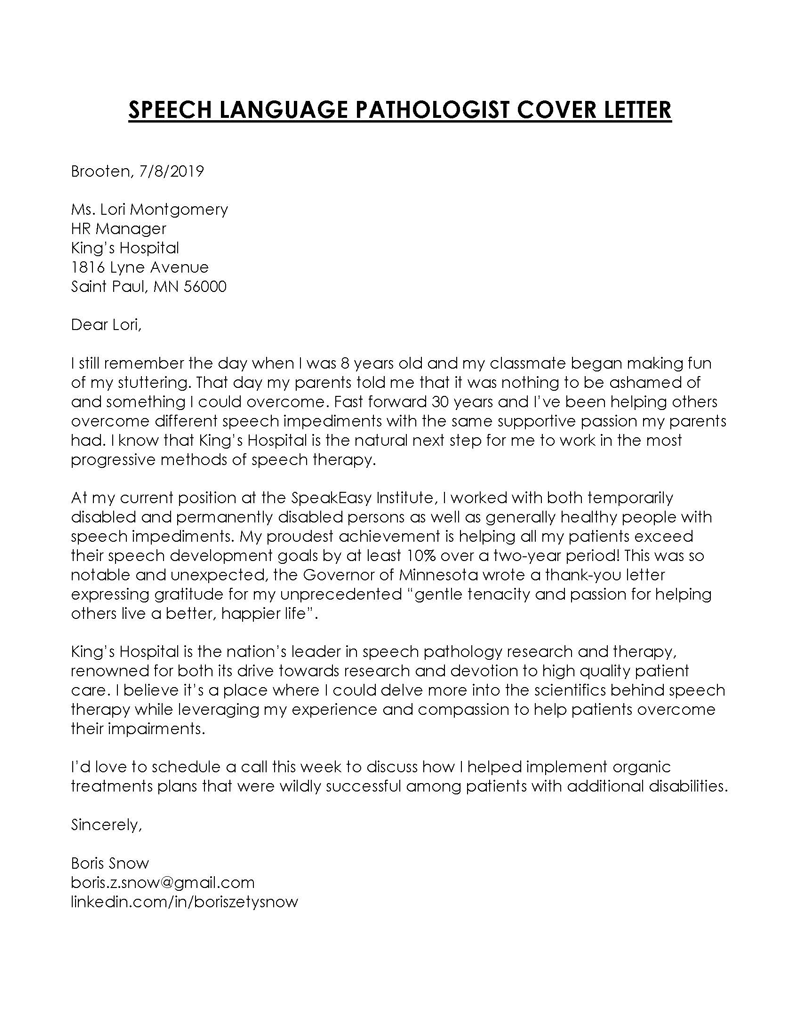
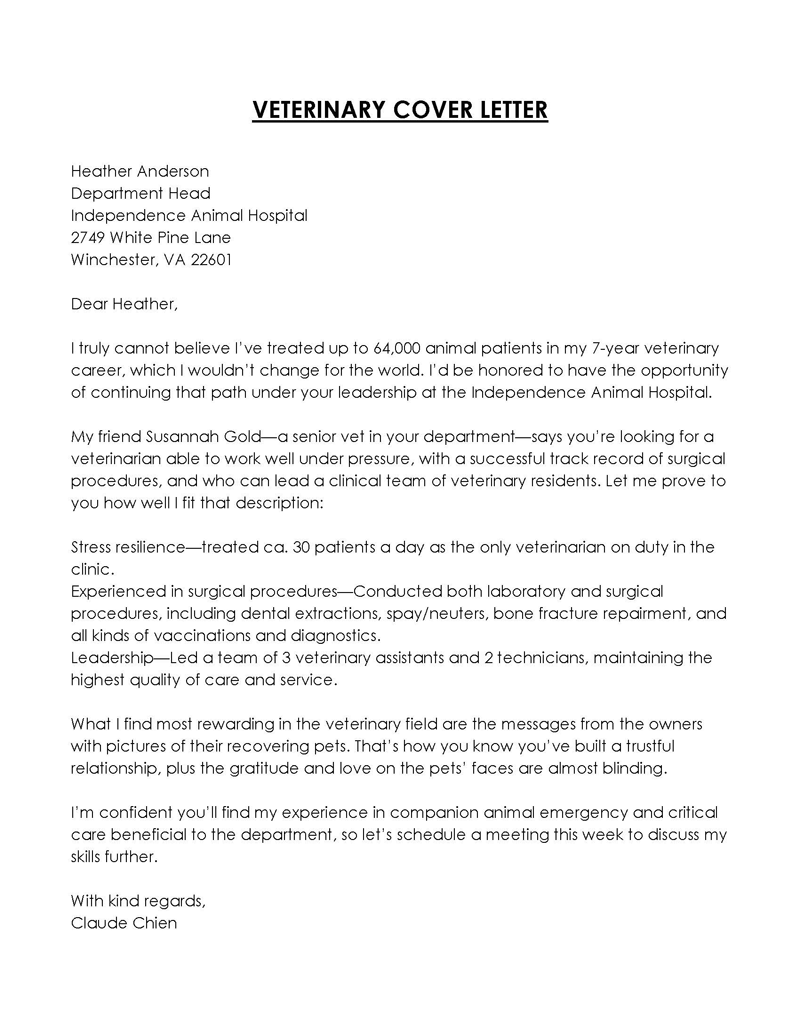
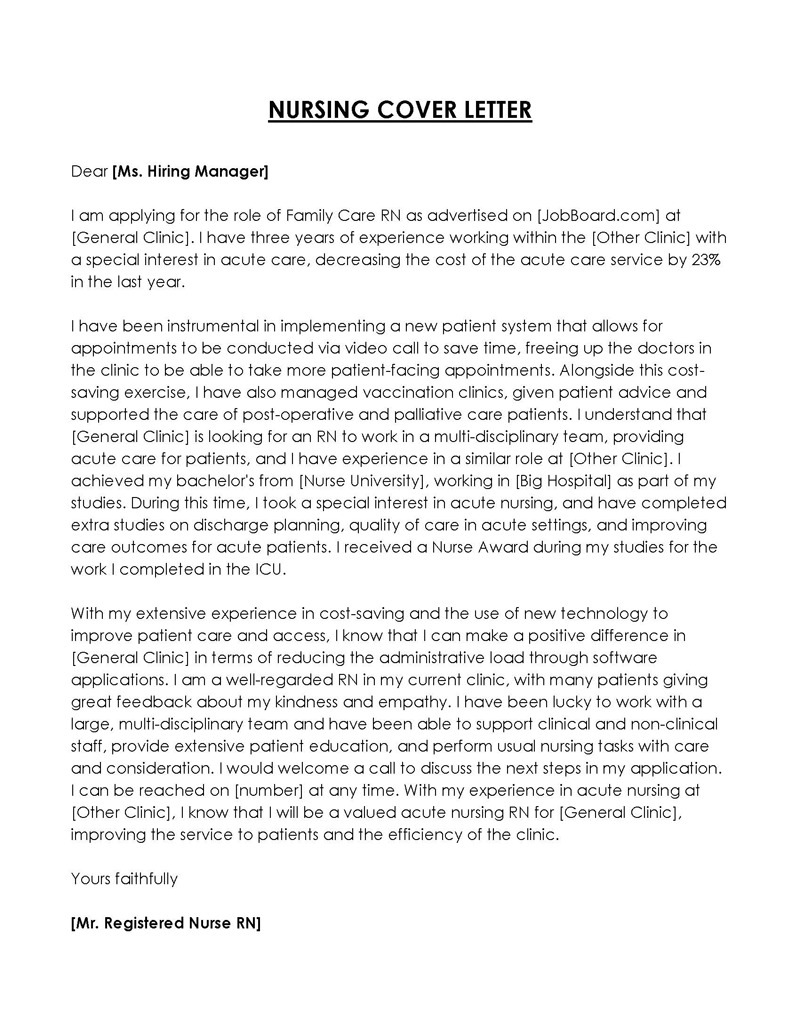
Mistakes to Avoid During the Writing Process
Your cover letter is your chance to make a great first impression with potential employers, and as a newly graduated nurse, it’s important to ensure that it is professional, polished, and error-free. However, there are some common mistakes that many new graduate nurses make when writing the letter, which can hurt their chances of landing a job.
In this section, we will discuss some of these mistakes and provide tips on how to avoid them, so you can make sure that your letter stands out for all the right reasons:
Making typing errors
One of the biggest mistakes you can make in it is to submit it with grammatical errors or typos. Make sure to proofread it thoroughly and have someone else review it as well before submitting it.
Focusing too much on yourself
While it should certainly highlight your skills, experience, and qualifications, it’s important to remember that the cover letter is ultimately about how you can contribute to the organization. Make sure to convey your enthusiasm for the position and how your skills and experiences align with the needs of the organization.
Providing fake or misleading information
Providing false information can be considered fraud and can result in serious consequences, such as losing the job or being dismissed from the position later on. Additionally, it’s important to build trust with potential employers and colleagues by being truthful and transparent about your skills, experiences, and qualifications.
Instead of falsifying information, focus on highlighting your genuine skills, experience, and accomplishments that make you a strong candidate for the position.
Addressing the letter to the wrong person
Be sure that you address the application to the right person and that all names and titles are correct. Not only will it look impolite if the documents are addressed to the wrong person, but it is also possible that your application does not even reach the right person.
Repeating your resume
A cover letter should not be a repetition of your resume. Instead, it is an official document that clarifies your intent, explains your worth, and highlights your strengths.
Use it to highlight your most relevant experiences and qualifications and provide additional context that may not be apparent from your resume.
Using a different font than your resume
Using a different font to distinguish it from your resume is not the best practice. Using the same font and layout shows professionalism.
Frequently Asked Questions
It should span no more than one page. It should be long enough to highlight vital details about you but readable enough for a hiring manager to review it quickly. Use short and direct sentences when outlining how you can help the employer.
You should use Calibri, Arial, or Times New Roman for your letter, matching it with the font on your resume. The recommended font size is 10-12 points.
It should include a header, a professional greeting, an engaging introduction, a brief overview of your qualifications, and relevant skills, and a formal conclusion with a sign-off.








